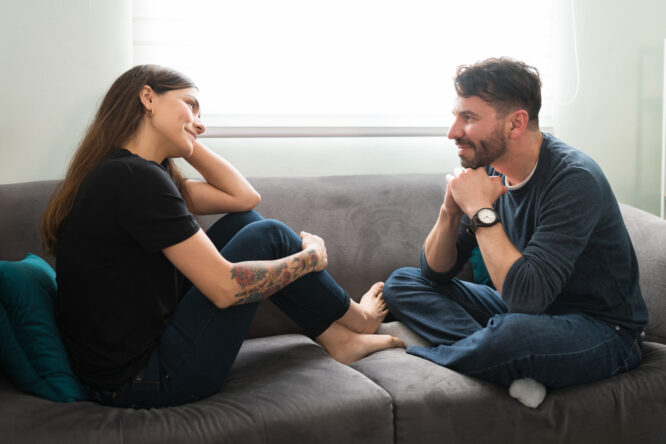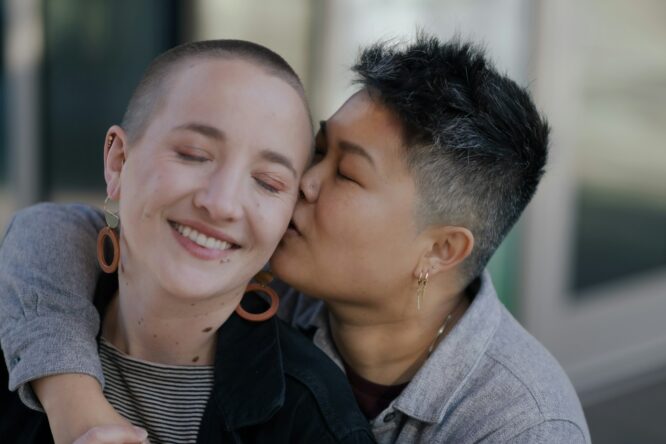Sometimes what we call love is actually something else entirely.

It can be fear of being alone, comfort in the familiar, or the rush of being needed. Attachment isn’t always easy to spot—it can feel intense, obsessive, even romantic. However, after a while, it becomes clear that it’s not about deep connection. It’s about habit, dependency, or filling a gap. If you’re unsure whether what you feel is love or just attachment, these tiny signs might help things click into place.
1. You feel more anxious than peaceful when you think about them.

If love makes you feel on edge, constantly wondering where you stand or what they’re thinking, it’s likely not love. True love brings a sense of safety, even in uncertainty. Attachment, on the other hand, often thrives on unpredictability. When your emotional state rises and falls based on their texts or attention, you’re probably caught in a cycle of validation-seeking. It feels intense, but it’s not stable—and love shouldn’t leave you in emotional whiplash.
2. You imagine a future with them more out of fear than excitement.

If the thought of a future without them makes you panic—not because you adore them, but because you hate the idea of starting over—that’s attachment speaking. It’s clinging to what’s familiar, not necessarily what’s right. Love makes you excited to build something. Attachment just hates the idea of loss. If you stay mainly because leaving sounds terrifying, it might not be the deep bond you think it is.
3. You can’t really name what you admire about them.

Being in love usually comes with a deep appreciation for who someone is—their values, their kindness, their quirks. If you’re struggling to name more than surface-level traits, it could be a sign that you’re more attached to the idea of them than the person themselves. When love is real, admiration comes naturally. However, when you’re attached, you might cling to someone more for how they make you feel in the moment than for who they actually are as a person.
4. You feel relieved when they give you attention, but not genuinely seen.

Attachment thrives on those little crumbs of affection—the random text, the sudden interest after distance. However, if you feel more relieved than emotionally fulfilled when they engage, that’s not real connection. It’s about feeding your nervous system, not your soul. True love feels like being seen, known, and appreciated. Attachment feels like anxiety momentarily soothed.
5. You’re constantly second-guessing yourself around them.

If you change how you speak, act, or express opinions just to avoid conflict or keep their interest, that’s a red flag. Love allows you to be yourself. Attachment often morphs into people-pleasing just to keep the connection intact. You shouldn’t have to shrink or edit yourself to be loved. If you do, the relationship might not be built on love—it might be built on fear of rejection.
6. You overlook dealbreakers and red flags.

When you’re attached, your brain becomes an expert at explaining things away. You tell yourself they didn’t mean it, or that things will get better soon. Love doesn’t require you to abandon your standards. Real connection can handle honesty. If you’re making constant excuses for behaviours that go against your values, you’re not seeing them clearly; you’re seeing them through the lens of emotional dependence.
7. You don’t really feel emotionally safe with them.

Attachment will make you cling to someone even if you don’t feel emotionally held or secure. You might avoid sharing your real thoughts or struggles because you’re afraid they’ll pull away. Love allows space for vulnerability without punishment. If you’re constantly censoring yourself or hiding your truth to keep the peace, the connection likely isn’t built on emotional intimacy.
8. You feel an overwhelming need for reassurance.

Needing a little reassurance in any relationship is normal. However, if you feel constantly unsettled unless they’re actively affirming your worth, it’s probably not love—it’s fear of abandonment disguised as romance. Attachment tends to crave reassurance to cover up insecurity. Love doesn’t demand constant proof. It grows from consistency, not desperation.
9. You idealise them more than you accept them.

If you find yourself imagining how amazing things could be with them, instead of accepting how things actually are, you’re likely in an attachment loop. It’s more fantasy than reality. Love isn’t blind; it sees the flaws and still shows up. Attachment often paints a version of someone you want to believe in, not the version who’s really there.
10. You’re more scared of losing them than excited to grow with them.

There’s a difference between wanting someone and needing them to avoid falling apart. If fear is the main thread holding you in place, that’s a sign you’re attached, not in love. Love is expansive—it looks forward to the future. Attachment is restrictive—it clings to what exists, even if it isn’t healthy, because the idea of letting go feels too unbearable.
11. You stay to avoid loneliness.

It’s hard to admit, but sometimes we stay because we fear the silence more than we value the connection. You may confuse the presence of a person with the presence of love. If your heart sinks at the idea of being single—not because you’d miss them, but because you dread being alone—that’s attachment keeping you tethered, not true emotional connection.
12. You don’t feel more yourself around them, you feel less.

Real love supports your growth and lets your personality breathe. If you feel smaller, quieter, or less like yourself when they’re around, it could mean you’re adjusting to fit into their world rather than being loved in your own. Attachment sometimes masquerades as connection, but it tends to stifle you instead of bringing you out more fully. If you feel dimmed, that’s a sign worth listening to.
13. You feel guilty for wanting more.

When you’re attached, even your unmet needs start to feel like a personal failing. You question whether you’re asking for too much or being too sensitive instead of admitting that something’s off. Love makes space for your needs. If expressing them makes you feel guilty or needy, you’re likely holding on to someone who doesn’t actually meet them.
14. You constantly imagine how to “fix” the relationship.

There’s a difference between growing together and mentally problem-solving a connection that’s never really worked. If you’re always rehearsing new strategies to make things finally click, it’s probably not love—it’s survival mode. Healthy love doesn’t require constant emotional negotiation to feel safe. If it’s this much work just to feel okay, the foundation might not be what you think it is.
15. You confuse intensity with intimacy.

Big feelings, high highs and low lows, wild passion—that’s often mistaken for love. Of course, intensity can also come from instability, not closeness. Chaos doesn’t equal depth. True love feels warm and secure, not like an emotional rollercoaster. If the relationship feels like constant drama, it’s likely fuelled by attachment and emotional volatility, not true emotional bonding.
16. You’re more focused on not being left than being truly happy.

Ask yourself honestly: are you holding on because it’s making you better, happier, more yourself, or are you holding on because you’re terrified of what life looks like without them? When your main goal is just to keep the relationship alive, not to feel joy, safety, or growth within it, you’re staying for survival—not love. And the hardest part? You often don’t realise it until you finally let go.




